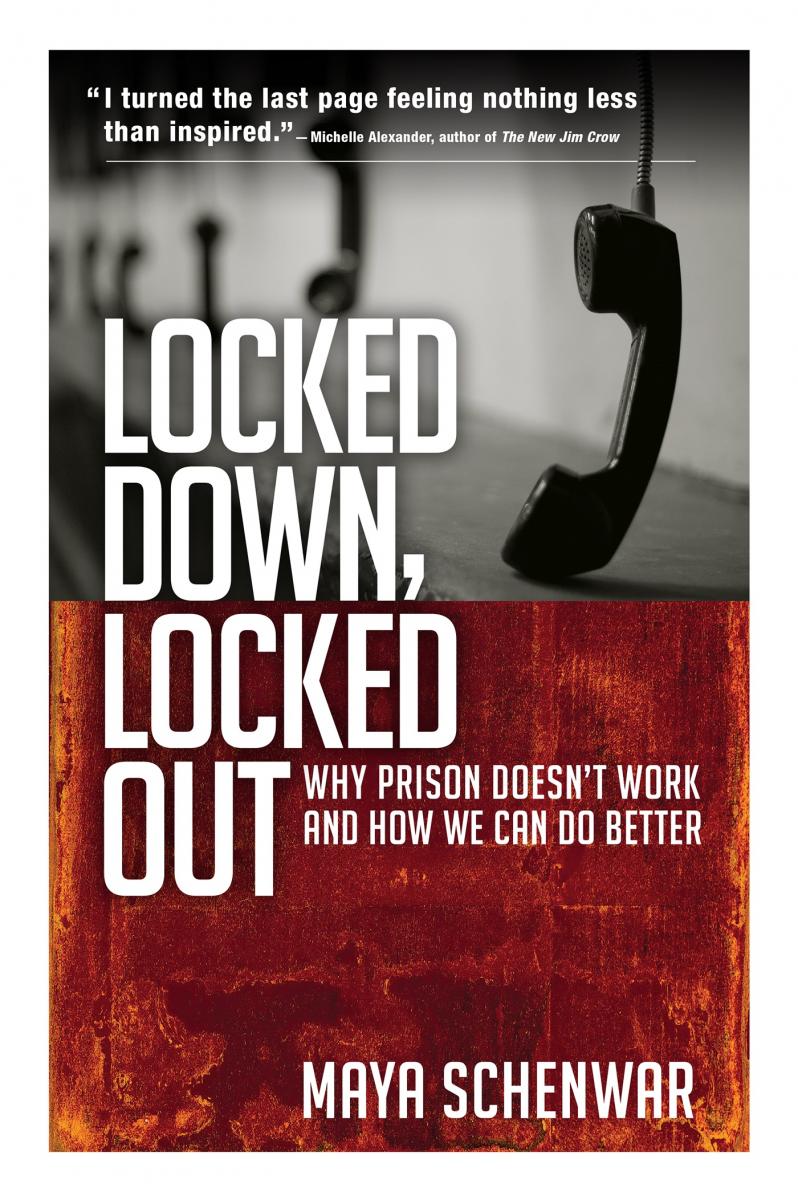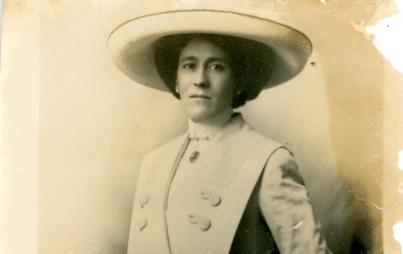
Credit: ThinkStock
As editor-in-chief of Truthout, an independent social justice news website, Maya Schenwar is inundated in progressive issues and causes. One that has particularly resonated with her, and her readers, is the issue of prison reform. Having written about the prison-industrial complex for Truthout, The New York Times, The Guardian, The New Jersey Star-Ledger, Ms. Magazine, Prison Legal News and others, she decided to turn her research and insights into a book.
On November 10, her tome Locked Down, Locked Out: Why Prison Doesn't Work And How We Can Do Better will hit the shelves. Here, we share a portion of one of its chapters, "The Case For a Pen Pal." Read Maya's take on women in prison as part of our special Conversation series here. And order her book here.
***
Chapter 6
The Case for a Pen Pal
Only connect.
-E. M. Forster, Howard's End
Kayla's pregnancy and postbirth incarceration in 2013 breaks me of my nostalgic fondness for letters. The urgency of the situation-the baby-strains the space between us, and at this overcrowded prison letters take three weeks to be processed upon arrival. I am dropping envelopes in the mail slot with a kind of reckless uncertainty, knowing that many of my messages will fall useless into Kayla's lap, bearing outdated questions or now-irrelevant tips. But as our correspondence continues, I begin to think: The reason I once loved writing to Kayla was because it offered a chance for deep, sustained communication-a communication that doesn't usually happen between people who are, in so many ways, hundreds of miles apart.
I've corresponded with a couple of dozen prison pen pals over the past eight years. The "use" of pen-palship has made itself visible in small and large ways over the course of these loosely threaded friendships. Sometimes, a piercing phrase will spring up out of the envelope-a truth that will never leave my mind. At other times, a prisoner will contribute a vital bit of information that proves unavailable anywhere else. Often, though, the "use" of pen-palship is not in the particulars of what is being communicated, but in the act of communicating.
Prison is built on a logic of isolation and disconnection. Letters between pen pals are almost always exchanged for the opposite purpose and with the opposite effect: connection.
As summer dawns, I think a lot about how the act of pen-palling is significant, not just for my relationship with my sister, but in the way it mirrors the mindset shift that will be necessary to rethink how our society "does justice" on a much larger scale. My conversations, correspondences, and relationships with prison-torn families have taught me that separation breeds more separation, that the coldness and isolation of prison breed the coldness and isolation of violence. And I think about how the one-on-one relationship, in which the prisoner emerges as a person (with thoughts, a personality, a history, hopes, dreams, nightmares), might serve as a model for the beginnings of a person-based, connection-based justice system.
Their "Side of the Story"
In early 2013, Beth Derenne from the Women's Prison Book Project (WPBP) sends me a packet of thank-you letters from women who've participated in her book exchange. I flip through the pages, pausing on a letter from Sable Sade Kolstee, who describes herself as a book lover with a "thirsty brain." I drop her a note to see if she'll answer some questions for my book on prison and disconnection. She responds promptly in round, clear print: "I am 26 years old and a mother to 3 beautiful children. When you talk about disconnected-I was shut off from my children from April 4, 2010 until just this month, March 2013. My crime put restrictions on my contact with minors."
Sable writes achingly of how she's been severed from her three young kids, all under the age of eight. Over the course of her incarceration, Sable has missed a long list of early milestones: "first steps, concerts, growth, birthdays, holidays, and many more." Letters, calls and visits from her children have been banned until recently, she writes: "My greatest challenge was fighting for the children. So many times counselors would say 'I understand.' I would look at them and tell them not to lie to me because none of you have ever gone 1 year, 18 months, 2 years without your children." 
The battle for her children won't end upon release, Sable says. The terms of her parole will also mandate a separation from her children. And, she writes, her "separation" extends beyond contact with her kids, and even beyond the limits of the law. She's worried about how people will perceive her. "It's not that I think I won't be able to make a positive contribution to society when I get out," she writes, "but the stigma I will live with for the next 22 years will possibly make me shy or frightened of judgment. Although I want to help others and show my children that a mistake does not define you."
At this point, I'm absorbed and pained; I feel for my new pen pal. And I'm rooting for her! But the gigantic thought bubble hanging over my brain is shouting, "What was the mistake?" What act would bar her from receiving visits from her kids-or leave her with a twenty-two-year postrelease "stigma"?
I google her, of course. One cruel irony prisoners face is that while they're behind bars, unable to speak for themselves, the Internet offers up a host of third-party information about them: mugshots, court documents, personal data (age, height, weight, tattoo verbiage), past records, and often-sensational press coverage of their convictions. A couple of newspaper snippets disclose that at twenty-three she was convicted of "statutory assault"-having a "sexual relationship" with a "known minor male" over the course of a couple of months, as evidenced by text messages exchanged between the two. I write Sable for her perspective on what happened.
Asking prisoners for their "side of the story" can be an awkward affair, something it doesn't even make sense to do unless the incarcerated person initiates the conversation; after all, the story is just one of each prisoner's stories-the act for which they're incarcerated doesn't define them-and the last thing a pen pal should be doing is implying that. Perhaps I shouldn't have broached the topic in the first place. But Sable's very straightforward: She "did it," she says. In her early twenties, she was attending college and caring for her three young children (including a newborn). The kids' father, Derrick, was in prison, and Sable, overwhelmed (she says she'd been "codependent" on Derrick), began to drink, use drugs heavily, and "sleep around with whoever." From there, she says, her judgment slid downhill. She began dating a guy who, a month and a half in, told her he was fifteen. They fought, he left-but he continued coming around at night for a couple of weeks, and Sable, drunk and lonely, suppressed her major qualms. "I thought, hell I did this at that age," she writes. The relationship soon ended, but Sable subsequently discussed it with a friend-who turned her in to the cops. She was charged with five counts of statutory sexual assault.
In the grand hierarchy of public perceptions of crime, ranging from I-don't-know-why-this-person-is-in-prison to this-person-is-despicable-scum, people incarcerated for sex offenses are categorically deposited into the "scum" pile. I'd never corresponded with someone in this position before, except for brief interview-style exchanges for articles. Honestly, if I hadn't impulsively written Sable based on her WPBP letter, I probably would've looked up her conviction and, glimpsing "sexual assault," ruled her out.
But I didn't, and now we were friends, and-though I didn't and still don't pretend to fully comprehend the ins and outs of her case-when she wrote of her hunch that if she'd had money for a decent lawyer, she'd "never have seen a day in prison," I thought, "She's probably right." I google "age of consent." In Spain, it's thirteen. In Austria and Bulgaria, it's fourteen. In Turkey, it's eighteen. In Costa Rica, it's fifteen. And in Pennsylvania, where Sable was convicted, it is sixteen; the boy with whom she had sex was fifteen years old. I wonder: What defines a sex crime, what makes someone a sex "criminal," and why am I so hesitant about writing to someone who's been branded with that label? I've had pen pals who have pled guilty to murder. Why am I even more insecure about corresponding with a woman who admits to a statutory sex offense? How do our definitions of "human" match up with our categories of "crime"? Questioning the labeling of a "sex criminal" is not to diminish the tragedy and trauma of rape, or the pain of survivors, who are often underrecognized, ignored, or even punished in our culture. Rather, it's about questioning the logic of a system in which a person becomes defined by one of their acts-defined as that act instead of as a person. The questions knock at my brain. Sable and I continue to write.
For most of her prison sentence, Sable was barred from seeing or speaking with her children, but just before she's released she is granted one visit. When the day comes, her oldest kid remembers her right away, and she's "loving, excited and quite the chatterbox," Sable writes me. Her three-year-old boy is understandably shy; for most of his life, his mother has been invisible. Meanwhile, her middle child stays quiet, rarely smiles, and looks down a lot. Eventually, though, she gazes up at Sable and asks whether she can "live with [her] forever."
The answer is no. After Sable is released, she'll still be held tightly in the prison nation's grip. She will spend three years on parole, held to an 8 p.m. curfew each night. She writes that she can't have a driver's license, and must avoid the Internet, cell phones, "excessive amounts of candy," and "contact with minors"-including her own children. Her conflicted feelings squeeze through the lines of her letters-her desperation for freedom, her fear of long-term separation from her kids, her longing for fresh air, her anxieties around the millions of unknown people who will share that fresh air with her. But a few days before departure, she says she's ready. She writes to me: "I have a long list of things I have to do. The first thing I'm doing is eating a pizza. After that, my steps towards my new life can begin."
I wasn't expecting an update on that "new life," let alone the pizza. But a month later, I'm delighted to find a letter from Sable in my box, this one sent from her grandmother's house in New York. "I did have pizza my first day out-it was SO good," she writes. She's also enjoying the series of small decisions that comprise her days on the outside: picking out her clothes, cooking a meal, choosing to go for a barefoot walk along the nearby river ... as long as she's sure-as sure as one can be-that she will not come across a minor. Indeed, there are many choices she can't make. She can't find a job, so is tethered to her "Gram" (who loves her but is prone to getting "worked up into a tizzy"). She still can't see her kids. And her face is plastered on a sex offender registry for the next twenty-two years. Months later, I receive a short note from Sable: "Being on parole is the hardest thing ever." I wrack my brain for encouraging things to say-but "Hey, you're getting out soon!" doesn't work anymore. I end up simply writing, "I'm so sorry."
"We Cannot Be Passive Recipients"
In the book Howard's End, E. M. Forster wrote his instructions on the best way to live in two short words: "Only connect." (E. M. Forster, incidentally, also announced on the BBC, in a fiery 1934 critique of the mechanization and industrialization of society, "Prison is no good." 6)
When we reach out to a prisoner to "only connect," we will always-to some extent-fail, because the barriers are so vast and so entrenched. But there are few cases in which a personal act that takes so little time can make such a great difference. I encourage anyone with the time, capacity, and emotional energy for it to reach out. In the appendix of this book there is a list of resources to help you become a pen pal. If you're reading this book (and I know you are-or at least you're reading this page), flip on back.
Before diving in, pen pals should check in with themselves, issuing a stern reminder that the act of writing a prisoner is not an act of charity. It's about growing a unique breed of friendship. In fact, it's one of the few contexts where you're able to throw out a line to a stranger and say, "Will you be my friend?" It is an act that is not driving toward any clear, ostensible goal. Rather, it's the goal-less endeavor of "getting to know" another person, which, for whatever reason, can be one of the most fulfilling, interesting, and transformative things to do in life. It's also a primary building block for any greater political possibility that relies on connection between human beings-which, it seems, applies to every viable political possibility under the sun.
As the Illinois-based pen-pal collective Write to Win puts it: "We see individual correspondence with people on the inside as one piece of the larger struggle to abolish the prison-industrial complex and to create safe, sustainable, and equitable communities. To this end, we see our work as a way to undermine the isolation, dehumanization, and destruction of the PIC by building grassroots networks of support and solidarity between folks on the inside and folks on the outside."7 In other words, how can policy change-or, for that matter, deep systemic change-evolve, if outside activists and theorists and advocates aren't talking to the people they're talking about?
Lacino Hamilton, my pen pal in Michigan, emphasizes that prisoners need to vocalize their experiences, and an outside audience is key. "We cannot be passive recipients of the efforts of others," he writes. "We have to be part of the work being done."
What efforts-and what work? Well. The pen-pal journey is certainly not the endgame; it's the beginning game. Perhaps, then, "Only connect" is not a perfect motto. Lacino's words highlight the potential of prisoners' connections with outside allies to build creative new models, initiatives, movements-maybe even revolutions!-that cultivate a more just world.






